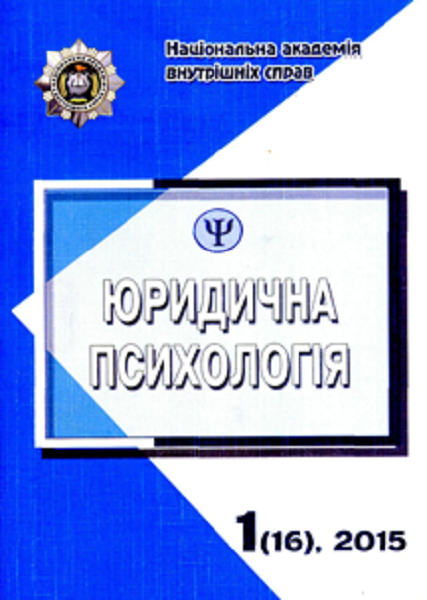Counselling as a way of ensuring judicial activities
Abstract
This article is dedicated to analysis of the legal norms, scholarly sources and litigation of the consultant psychologist involvement in the judiciary. Investigation, that took place in this article rise up psychological issues that arise immediately upon the administration of justice within court personnel work. Which make it possible effective and promising option for solution of those issues – involving a person, who possesses profound psychological knowledge in the form of a psychologist-consultant. One that will provide the fundamental principles of justice and positive reform of the judicial system in order to improve the effectiveness of judicial institutions.
Absence of practice of bringing in of psychologist-consultant to the trial, regardless of category of businesses, predefined by the row of reasons. First from them it is possible to admit insufficiency of lineation at legislative level of judicial status of psychologist-consultant, his rights and duties, tasks and functions in a trial and others like that. However, it is necessary to mark that, as a legislator limits neither possible actions nor forms of participation of psychologist in rule-making, then his participating in many cases is the real and possible without any changes or additions of current legislation.
In sub-normative acts and at official interpretation it costs to give mind judges in relation to possibility of bringing in of psychologists-consultants during realization of judicial actions, especially in connection with originality of behavior of persons in relation to which judicial actions come true.
Downloads
Abstract views: 136 PDF Downloads: 472
- Authors reserve the right to authorship of their own work and transfer to the magazine the right of the first publication of this work under the terms of the Creative Commons Attribution License, which allows other persons to freely distribute published work with mandatory reference to authors of the original work and the first publication of an article in this magazine.
- Authors have the right to enter into separate additional agreements on non-exclusive dissemination of the work in the form in which it was published in the journal (for example, to post an article in the institution's repository or to publish as part of a monograph), provided that the link to the first publication of the work in this journal is maintained.
- The journal's policy allows and encourages the posting of articles by authors on the Internet (for example, in electronic storehouses of institutions or on personal websites), both before the submission of this manuscript to the editorial office and during its editorial processing, as this contributes to the creation of a productive scientific discussion and positively affects the efficiency and dynamics of citing the published work.




